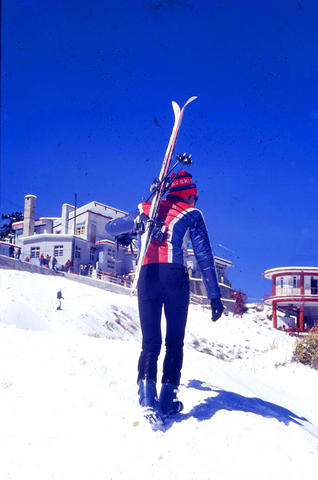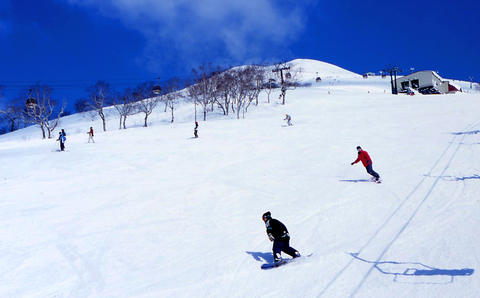On the slopes of Hohuanshan (合歡山), not far from the Central Cross-Island Highway (中部橫貫公路), stand the relics of Taiwan's attempt to build a center for skiing on the island. Not much remains now but a memory for men like Cheng Wen-feng (鄭文豐), the director of the Chinese Taipei Ski Association (中華民國滑雪滑草協會, CTSA), who 30 years ago was one of a small number of Taiwanese people who did not want living on a sub-tropical island to prevent them from enjoying skiing.
"That was still the time of martial law and most Taiwanese people were not allowed to travel abroad," he said in an interview in the association's cramped and cluttered offices.
With the advent of democracy, overseas travel became possible for Taiwanese sports enthusiasts who discovered that South Korea and Japan offered vastly more accessible ski facilities than Taiwan. As a result, in 1990 the ski operations on Hohuanshan came to an end.

PHOTO:COURTESY OF CHENG WEN-FENG, CHINESE TAIPEI SKI ASSOCIATION
Now, the association and some other tour operators offer specialized ski trips to these destinations, and the sport is gaining popularity. On the day we met, Cheng oversaw 10 pre-trip briefings alone with an estimated 2,000 people participating in ski trips organized by the association for this winter season.
Cheng recalled the early days of Taiwanese skiing when there were no lifts and skiers had to climb the hills that they skied down. "We weren't very good, but we were very fit," Cheng said with a laugh. "After all, Hohuanshan rises to over 3,000m, much higher than most international ski resorts."
As an active member of Taiwan's ski community, he oversaw skiing activities on Hohuanshan in the early 1980s and said that at its peak, they were seeing around 1,400 people skiing there every year. "The lift was built in 1973, but there were no funds to maintain it and it quickly became too dangerous to use," he said.

PHOTO: COURTESY OF THE JAPANESE TOURISM ASSOCIATION
The association was originally set up as an administrative base for training athletes for international competition, but these days Cheng's main task is to promote skiing in a nation where snow is generally only seen on the television. With a background in the tourism industry, he has high hopes of creating packages that cater to those who want a taste of something new.
"We have seen numbers increase very significantly in the last few years," he said. Under Cheng's leadership, the association has become more directly involved in organizing trips. "It is not always easy for conventional tour operators to understand the needs of ski tours," he said.
Steve Yang (楊士成), the general manager of Naruwan Tour (那魯灣旅行社), the only local travel agency with a significant offering of ski-specific travel packages, has also seen numbers grow gradually, but says the agency is able to carry this section of its business only because of his own personal commitment to the sport. His agency will have between 60 and 70 tour groups going out on dedicated ski packages this year. "But with only around 6,000 people, this is a drop in the ocean of Taiwan's travel industry," he said. "Taiwan has around eight million outward bound tourists a year, so it is a tiny percentage."
One of the greatest obstacles for Taiwanese people learning to ski, according to Cheng, is their total unfamiliarity with snow and even the very concept of skiing, a situation that poses unique learning challenges. "Many of our novice skiers have probably never even stood on snow before," Cheng said. "It can take them much longer than other people to find their balance ... so if they join a local (Japanese or Korean) ski school, they may quickly find themselves falling behind. This is not a good way to start."
For this reason, the CTSA has put great effort into training instructors to meet the needs of Taiwanese students. "These people are on the front line of providing the ski experience, so they are the most important people in helping promote skiing among the Taiwanese," Cheng said.
Yang, who used to manage travel plans for the CTSA but split from the association to establish his own ski tours through Naruwan Tour, has also established his own ski and snowboard school, and has gradually built up a cadre of instructors who accompany tours and help novice skiers.
"Many of them own their own companies, or are engineers in the Hsinchu Science Park (新竹科學園區), and so their time is limited," Yang said. His instructors gain their qualifications through the Canadian Ski Instructors Association's certification system. To improve the quality of tours, both Yang and Cheng emphasized the importance of the instructor-to-student ratio, especially as most packages cater to novice or intermediate skiers.
The CTSA has also drawn up its own certification guidelines based on Canadian and Japanese systems, and currently has over 60 certified instructors. "We hope to get the ratio down to one instructor for six to eight students," Cheng said. He says that this will address both safety and quality considerations.
Due to the lack of information about skiing and the difficultly in obtaining equipment locally, Yang's Naruwan operations have gradually grown from simply offering ski packages to importing and, in some cases, manufacturing entry-level ski equipment. A regular customer who owns a glove factory now provides gloves through Naruwan; the same goes for goggles, ski pants and other paraphernalia. "We don't want customers to feel they have to invest tens of thousands of dollars before they can go skiing," he said. "We do what we can to bring the price down for those wanting to ski for the first time." For those who have caught the ski bug, Yang also imports skies and boots to order. It is all a very long way from the regular business of running a travel agency.
Most Taiwanese skiers head to Japan, which has almost completely replaced South Korea as the destination of choice. "In the past, South Korea was significantly cheaper than Japan as a ski destination," Cheng said, "but in the last few years, due to the strengthening of the South Korean economy, prices are about the same, and the quality of both the snow and the facilities is significantly better in Japan." Both the CTSA and Naruwan stopped offering ski packages to South Korea this year.
Japan's reputation as a good destination for Taiwanese skiers has been pushed mainly by the local sports community rather than through active promotion of Japanese tourism authorities.
According to the Japan Tourism Association, efforts to promote skiing had virtually no impact and they no longer emphasize winter sports as part of their promotion campaigns. Cheng said that his own efforts to promote skiing through the media had stepped up a gear this year, and he hoped that this would be reflected in further growth next season.
Until now, the spread of skiing as a sport in Taiwan has been promoted largely through word of mouth, with Yang saying that almost half of their tours are packed with return customers. For companies such as Sunhi Tour (尚海旅行社), a small operation based in Ilan that specializes in customized travel packages, the return rate for ski trips is as high as 80 percent, according to owner Lei Chen-chou (雷震州).
Lei, a longtime tour leader, said that these groups are unique in Taiwan's tourist industry. "In most tour groups, when the trip is over, everyone goes their own way. The hardships endured as people learn to ski, and the help and support they give each other during the trip often develop into more enduring friendships," he said.
Lei attributes the fact that ski packages have been restricted to a tiny minority of agencies such as Naruwan and Sunhi to the dependence on a base of dedicated skiers who return every year.
Cheng hopes to change this and make skiing a mainstream holiday option for Taiwanese people. "Two of Taiwan's largest travel agencies have agreed to include our ski packages in their marketing channels," Cheng said, referring to Cola Tour (可樂旅遊) and Lion Travel (雄獅旅遊). "Big travel agencies such as Lion and Cola are able to offer facilities such as payment by installments, something that we cannot do," Cheng said. He expects this marketing push to begin by the end of February. He also said that plans are afoot to add English pages to the CTSA's Web site to allow foreign residents to participate in Taiwan's slowly developing ski tourism industry.

The primaries for this year’s nine-in-one local elections in November began early in this election cycle, starting last autumn. The local press has been full of tales of intrigue, betrayal, infighting and drama going back to the summer of 2024. This is not widely covered in the English-language press, and the nine-in-one elections are not well understood. The nine-in-one elections refer to the nine levels of local governments that go to the ballot, from the neighborhood and village borough chief level on up to the city mayor and county commissioner level. The main focus is on the 22 special municipality

The People’s Republic of China (PRC) invaded Vietnam in 1979, following a year of increasingly tense relations between the two states. Beijing viewed Vietnam’s close relations with Soviet Russia as a threat. One of the pretexts it used was the alleged mistreatment of the ethnic Chinese in Vietnam. Tension between the ethnic Chinese and governments in Vietnam had been ongoing for decades. The French used to play off the Vietnamese against the Chinese as a divide-and-rule strategy. The Saigon government in 1956 compelled all Vietnam-born Chinese to adopt Vietnamese citizenship. It also banned them from 11 trades they had previously

Hsu Pu-liao (許不了) never lived to see the premiere of his most successful film, The Clown and the Swan (小丑與天鵝, 1985). The movie, which starred Hsu, the “Taiwanese Charlie Chaplin,” outgrossed Jackie Chan’s Heart of Dragon (龍的心), earning NT$9.2 million at the local box office. Forty years after its premiere, the film has become the Taiwan Film and Audiovisual Institute’s (TFAI) 100th restoration. “It is the only one of Hsu’s films whose original negative survived,” says director Kevin Chu (朱延平), one of Taiwan’s most commercially successful

Jan. 12 to Jan. 18 At the start of an Indigenous heritage tour of Beitou District (北投) in Taipei, I was handed a sheet of paper titled Ritual Song for the Various Peoples of Tamsui (淡水各社祭祀歌). The lyrics were in Chinese with no literal meaning, accompanied by romanized pronunciation that sounded closer to Hoklo (commonly known as Taiwanese) than any Indigenous language. The translation explained that the song offered food and drink to one’s ancestors and wished for a bountiful harvest and deer hunting season. The program moved through sites related to the Ketagalan, a collective term for the